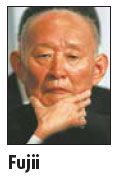
|
WORLD> Asia-Pacific
 |
|
Japan's new PM to assume office today
(China Daily)
Updated: 2009-09-16 14:05
TOKYO: Japan's next premier, Yukio Hatoyama, will assume his new office today and pick a veteran lawmaker as finance minister, domestic media said yesterday, adding experience and fiscal caution to his untested party's line-up. The appointment of Hirohisa Fujii, 77, who also served as finance minister in 1993-1994, was welcomed by analysts worried that new government spending plans aimed at putting more money in the hands of consumers will inflate Japan's already huge public debt as it struggles to emerge from recession. Hatoyama's Democratic Party of Japan (DPJ) has promised not to raise Japan's 5 percent sales tax for the next four years while the government focuses on cutting waste, but Fujii has called for discussion of an increase to fund the soaring social security costs of an aging society. Japanese media had widely tipped Fujii for the finance post, but recent reports had said his appointment faced opposition from former party leader Ichiro Ozawa, a political mastermind whose influence is raising concerns about a possible rival power center that could complicate policy decisions. One Japan expert in China said such a problem is unlikely.
"In choosing Fujii as the finance minister, Hatoyama takes his capability seriously. But Ozawa has a different view on that for emotional reasons," Huo said. He noted Fujii had always been Ozawa's "closest ally" until March, when Ozawa was forced to step down as DPJ's party chief. "For DPJ's future, Fujii suggested Ozawa to resign," Huo noted, which soured their relationship But Huo said such differences are unlikely to affect the Hatoyama-Ozawa partnership. "The key is they should clarify the boundaries of their powers from the start," Huo said. "And they are doing pretty well on this." He said Hatoyama, as the prime minister, is in charge of the country; and Ozawa is in charge of party affairs, "particularly elections", as he is the party secretary general. Huo said it is too early to predict how the leadership will develop, "but Ozawa won't be as influential (on governing) as he is during a election time." Hatoyama will become prime minister today after a stunning election win that brings to power a government also pledged to reduce the elite bureaucracy's control over policy-making that the Democrats say has encouraged wasteful spending and favored special interests over individuals. He has already chosen Naoto Kan, an ex-party leader and former health minister, to head a powerful new agency tasked with overseeing the budget process and setting policy priorities. Hatoyama has also named Katsuya Okada, another former party leader, to be foreign minister.
 Hatoyama will also give posts to the heads of two tiny coalition partners whose cooperation is needed in parliament's upper house to pass bills smoothly. Conservative People's New Party leader Shizuka Kamei will be in charge of bank supervision and postal services, public broadcaster NHK and other media said. A former LDP heavyweight, Kamei left the party in 2005 over then-premier Junichiro Koizumi's postal privatisation plans. Social Democratic Party leader Mizuho Fukushima, 53, will handle consumer affairs and policies to boost the low birth rate. Reuters; Zhang Haizhou contributed to this report |